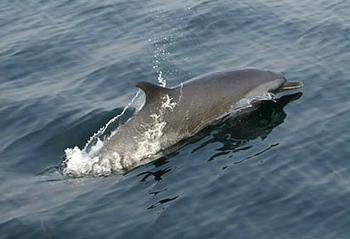Cross Posted from ENS
India’s Ministry of Environment and Forests has decided to forbid the keeping of captive dolphins for public entertainment anywhere in the country.
In a policy statement released Friday, the ministry advised state governments to reject any proposal to establish a dolphinarium “by any person / persons, organizations, government agencies, private or public enterprises that involves import, capture of cetacean species to establish for commercial entertainment, private or public exhibition and interaction purposes whatsoever.”

Noting that India’s national aquatic animal, the Ganges River dolphin, as well as the snubfin dolphin are listed in Schedule-I and all cetacean species are listed in Schedule II part I of the Wild Life (Protection) Act, 1972, the ministry said it is important to protect these endangered species from captivity and exploitation.
“Whereas cetaceans in general are highly intelligent and sensitive, and various scientists who have researched dolphin behavior have suggested that the unusually high intelligence; as compared to other animals means that dolphin should be seen as ‘non-human persons’ and as such should have their own specific rights and is morally unacceptable to keep them captive for entertainment purpose,” the ministry said.

FIAPO spokesperson Puja Mitra called the decision “a huge victory for the dolphins!”
“India has become a beacon of hope for the global movement to protect cetaceans from captivity, and we thank Minister Jayanthi Natarajan for setting the benchmark in animal protection for the world,” Mitra said.
FIAPO has been working with their partners Born Free Foundation, Global Green Grants Fund, Earth Island Institute’s Dolphin Project and Wildlife Rescue and Rehabilitation to bring about this prohibition in India for the past year.
Ric O’Barry, a former dolphin trainer who now serves as director of the U.S.-based Earth Island Institute’s Dolphin Project, applauded India’s new policy.
“This is a huge win for dolphins,” said O’Barry. Not only has the Indian government spoken out against cruelty, they have contributed to an emerging and vital dialog about the ways we think about dolphins – as thinking, feeling beings rather than pieces of property to make money off of.”

